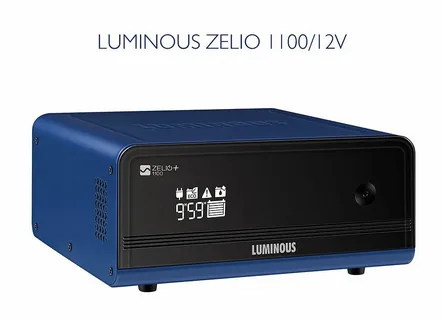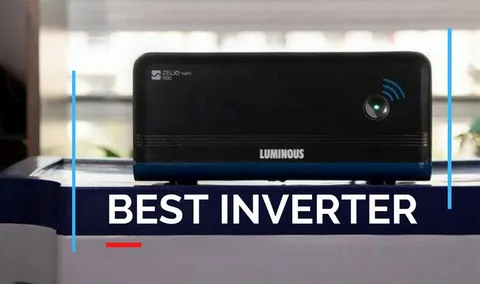Do you want to avoid dealing with unstable power sources and frequent outages? Look no further! This blog post will explore the best inverter for home that provide stable and efficient power solutions for various needs. Whether you are looking for an inverter for your home, caravan, or industrial use, we have you covered. Let’s dive into the world of inverters and uncover the ideal power solution for you.
Understanding Inverters and Their Importance
Inverters are pivotal in electrical power, transforming direct current (DC) into alternating current (AC), the form used by most household appliances and industrial machinery. This conversion process is indispensable when AC power from the grid is unavailable, such as during power outages or in mobile settings like caravans and boats.
Moreover, inverters are integral to renewable energy systems, allowing the use of solar or wind-generated electricity in standard electrical systems. The functionality of an inverter extends beyond mere conversion; it ensures the power supplied is compatible with the devices being powered, safeguarding them against damage caused by power inconsistencies.
For anyone relying on electronic devices, whether in a domestic setting, during travel, or within an industrial environment, an inverter serves as a bridge to operational continuity and efficiency. Its significance is underscored by its capacity to enable autonomy from the conventional power grid, providing a pathway to utilise alternative energy sources and maintain power in diverse situations.
Key Features to Look for in the Electric Inverter
Several crucial features merit your attention when selecting the electric inverter for your needs. Firstly, consider the output capacity of the inverter; it should match or exceed the total wattage of the devices you intend to power. A pure sine wave output is generally recommended, as it ensures compatibility with a wide range of electronics, including sensitive equipment, by delivering clean and stable power akin to that of the primary grid.
Efficiency is another significant factor; a high-efficiency inverter will convert a greater percentage of the input DC power into usable AC power, reducing energy losses and saving on costs in the long run. Moreover, the inverter’s connectivity options, such as the number and types of available outlets, USB ports, and remote control capabilities, can significantly enhance its convenience and versatility. Look for models with comprehensive protection features, including over-voltage, under-voltage, overload, short circuit, and temperature controls, to safeguard your appliances and the inverter.
Additionally, those interested in renewable energy solutions should consider inverters with built-in solar charge controllers or those compatible with solar panel inputs to facilitate easy integration into solar setups. Lastly, an inverter’s size and noise level may also influence your decision, especially for use in domestic or mobile settings where space is at a premium and quiet operation is desired.
Top Inverter Picks for Home Use
Selecting a suitable inverter for domestic environments can significantly enhance your daily power usage, offering both efficiency and reliability. Our recommendations focus on units seamlessly blending into your household’s energy demands. Key considerations include models delivering a pure sine wave output and ensuring sensitive electronics function without interference or damage. These inverters also come equipped with multiple AC outlets, allowing you to connect various devices simultaneously.
Safety is paramount, so our picks feature built-in surge protection, safeguarding your home appliances during unexpected power spikes. Size is an essential factor, too; choosing an inverter that aligns with your space availability and power requirements is advisable. These carefully chosen inverters promise to meet your household’s diverse needs and stand out for their user-friendly operation, making them an excellent addition to any home seeking a dependable power solution.
Discover the hybrid solar controller for Your Caravan Adventures.
Embarking on caravan adventures requires a reliable power source that can adapt to varying conditions and ensure your journey remains uninterrupted. A hybrid solar controller, combining the functionalities of a traditional inverter with a solar charge controller, emerges as an indispensable ally. This fusion not only simplifies the energy management system by streamlining the conversion of DC to AC power but also optimizes charging your caravan’s batteries using solar energy. One of the key advantages of a hybrid solar controller is its ability to harness the sun’s power, significantly reducing reliance on fuel-powered generators or external electrical sources.
This eco-friendly approach minimizes your carbon footprint and leads to substantial savings on energy costs in the long run. When selecting the ideal hybrid solar controller for your caravan, priorities models that offer maximum efficiency in solar energy conversion and provide a steady output to power your devices safely. Features such as MPPT (Maximum Power Point Tracking) technology enhance the charge efficiency, ensuring your batteries receive optimum charge even under varying weather conditions.
Moreover, versatility in connectivity options, including USB ports and AC outlets, can cater to all your gadgets and appliances. Ensuring the model is equipped with protective measures against overcharging, overheating, and short-circuits will safeguard your caravan’s power system, allowing you to focus on the adventure ahead with peace of mind.
 The Best Industrial-Grade Inverters Reviewed
The Best Industrial-Grade Inverters Reviewed
Selecting an inverter that can withstand the rigors of industrial environments is critical for ensuring uninterrupted operations and sustaining productivity. Industrial-grade inverters are engineered to manage substantial loads, making them ideal for applications that demand high levels of reliability and durability. Key features to priorities when choosing an inverter for industrial use include a robust design capable of resisting dust, moisture, and mechanical vibrations common in industrial settings. Additionally, look for models that offer high efficiency and can operate across various input voltages to accommodate varying power supplies.
The cooling system of an industrial inverter is another critical consideration; models with advanced technologies can maintain optimal performance even under continuous operation, which is often required in industrial applications. Inverters that support a wide array of machinery and equipment compatibility, including motors, heavy-duty tools, and sophisticated control systems, are particularly valuable.
Opting for inverters with scalable power options is beneficial, enabling you to customize the system according to your current and future energy requirements. Moreover, selecting an inverter with comprehensive protective features against overloads, short circuits, and thermal extremes is essential to safeguard your investment. These precautions ensure the inverter’s longevity and protect the connected machinery and equipment from potential damage, maintaining operational integrity and safety.
Installation Tips for ups surge protector
Installing a UPS (Uninterruptible Power Supply) surge protector can be straightforward, but attention to detail is essential to ensure optimal performance and protection. Firstly, select a location close to the devices you wish to protect yet away from direct sunlight, excessive heat, and moisture. It’s also vital to ensure the area has good air circulation to prevent overheating. When connecting your devices, make sure to plug them directly into the UPS surge protector, not into another power strip or extension, as this can undermine the effectiveness of the surge protection.
Additionally, it’s advisable to label your cables and connections for easy identification, which can save time during maintenance or troubleshooting. Regularly inspect your UPS for any signs of damage or wear, especially after a power surge, to ensure it continues to provide reliable protection. Lastly, consider consulting the installation manual provided by the manufacturer for any specific instructions related to your model, as this can offer valuable insights and help avoid common pitfalls during the setup process.
Maintaining Your Inverter for Maximum Efficiency
To maintain the peak efficiency and extend the lifespan of your inverter, undertaking regular maintenance is indispensable. Ensure that the inverter is kept in a clean environment, free from the accumulation of dust and residue, which can impede its functioning and cooling efficiency. Inspecting for any loose electrical connections or signs of wear and tear that could compromise its performance or safety is crucial. Regularly monitoring the inverter’s operational efficiency will help identify potential issues before they escalate into significant problems.
Adherence to the manufacturer’s recommended maintenance regimen is vital, as it is tailored to your inverter model’s specific needs and technical specifications. This routine check-up includes verifying the integrity of the inverter’s components and ensuring that any firmware updates provided by the manufacturer are applied promptly to benefit from enhancements and bug fixes. By committing to these maintenance practices, you can secure your inverter’s continuous, efficient, and reliable operation, ensuring that it delivers optimal performance throughout its service life.
Understanding Inverter Warranties and Support
Securing an inverter with robust warranty and support provisions is critical in safeguarding your investment and ensuring long-term satisfaction. Manufacturers that offer extensive warranty periods signal confidence in their products’ durability and performance. It is prudent to seek out warranties that cover not only the repair or replacement of faulty components but also extend to labor and associated costs, thereby providing a comprehensive safety net for buyers.
Beyond the duration of the warranty, the quality of customer support is paramount. Adequate support services can significantly reduce downtime and frustration, facilitating a smoother resolution process. It’s advisable to opt for manufacturers with a proven track record of responsive and helpful customer service, ideally with multiple communication channels such as phone, email, and online chat.
Accessibility to spare parts and authorized service centers is another critical consideration. Inverters widely supported across various regions ensure that should the need arise, repairs and maintenance can be carried out promptly and efficiently, minimizing any potential inconvenience. Lastly, it’s beneficial to familiarize yourself with the terms and conditions of the warranty. Understanding the scope of coverage and any obligations on your part, such as regular maintenance or the use of authorized technicians for repairs, can prevent any unwelcome surprises down the line.
Conclusion
Selecting the optimal inverter is crucial for ensuring a consistent and efficient power supply, whether it’s for residential, recreational, or commercial purposes. The right choice empowers you to manage power outages and fluctuations more effectively and integrate renewable energy sources into your system, thereby contributing to a more sustainable future. As we have journeyed through the critical aspects of what makes an inverter stand out, including its features, applications, and the importance of maintenance and warranties, the pathway to identifying your perfect power solution becomes clear.
FAQS
What is the difference between a pure sine wave and a modified sine wave inverter?
A pure sine wave inverter delivers a smooth, wave-like electricity flow, closely mimicking the power supplied by the grid. This type is ideal for sensitive electronic devices. A modified sine wave inverter produces a more squared-off wave, suitable for essential power tools and non-sensitive equipment, but may cause issues with more delicate electronics.
How do I determine the right size inverter for my needs?
The inverter size you require depends on the total wattage of the appliances you intend to power. Add up the wattage of all devices to get a rough estimate. Choosing an inverter with a slightly higher capacity than your calculation is advisable to accommodate power surges and future additions.
Can I use an inverter to power my home during a power outage?
Yes, but this depends on the capacity of the inverter and the energy demands of your home. Large-capacity inverters can power several household appliances simultaneously, but a substantial investment in a high-capacity inverter and possibly a backup battery system is necessary for whole-home power.
Is it possible to connect my inverter to a solar panel system?
Absolutely. Many inverters are designed to work seamlessly with solar panel systems, converting the DC electricity generated by the panels into AC power usable within the home. For a solar setup, ensure your inverter is compatible with solar integration for optimal performance.
| Other Good Articles to Read |
| Blogs-Peoples |
| Bryan Smith Blogs |
| intellect blogs |
| the fault in our blogs |
| blogs eu |
| oz forums |
| recruitment blogs |
| zet blogs |
| id blogs |
| Blog Studio legale |
| blogs map |
| Related Business Listings |
| Contact Directory |
| Local Business Profiles |



